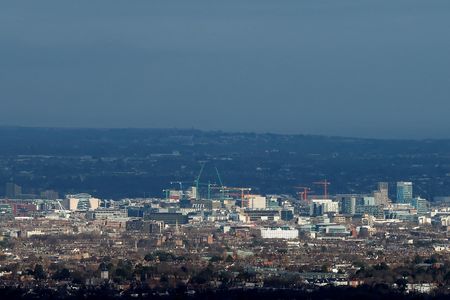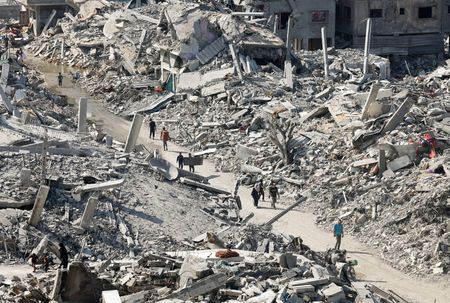DUBLIN (Reuters) – Ireland’s two dominant centre-right parties agreed a coalition deal with enough independent lawmakers on Wednesday to return to power for another five years and continue their previous high spending economic policy.
Here are some of the key details of their policy programme:
ECONOMIC POLICY
The incoming government has pledged to run budget surpluses and fund “appropriate” levels of current and capital expenditure growth, while also building up Ireland’s sovereign wealth funds. The policy programme did not include a commitment to introduce a new fiscal rule to moderate spending increases.
Any unexpected deterioration in the public finances would be met by postponing planned income tax cuts, maintaining capital spending and protecting existing levels of public services.
The plan includes pledges to boost public sector investment to address infrastructural deficits, increase pension payments, cut childcare costs and cut the value added tax (VAT) rate to 9% from 13.5% for food and catering service firms.
HOUSING
The plan aims to cut red tape, increase the amount of zoned land and funds for services such as water to accelerate housing supply. A tax rebate for first-time buyers of new homes will be revised and a state-supported shared equity scheme extended to qualified buyers of all homes, not just newly built ones.
The effectiveness of rent pressure zones that cap the level of rent increases will “continue to be reviewed”, while a tax credit to reduce rental costs will be progressively increased.
IMMIGRATION
The government will expand staffing at every stage of the immigration system to more quickly process visa and immigration permissions, implement stronger border security and restrict the movement of asylum applicants in state accommodation.
It will also enforce policies to protect migrants from exploitation and abuse, and develop community-led initiatives to foster connections between migrants and local populations.
CLIMATE
The plan recommits to achieving a 51% cut in greenhouse gas emissions from 2018 to 2030, and net-zero emissions no later than 2050, as well as reaching 80% of electricity generation from renewable sources by 2030. The government will also continue with the planned carbon tax increases.
The plan allows for the construction of new data centres that contribute to efficient grid usage, such as prioritising waste heat capture for district heating systems and other local uses.
FOREIGN POLICY
The deal commits to progressing legislation prohibiting trade with Israeli settlements in the occupied Palestinian territories.
The previous government pledged in its final days to push through the bill first tabled in 2018 by an independent lawmaker if re-elected after it said a UN court decision freed it to make trade decisions independently of the European Union
AVIATION
The new government said it would work with stakeholders to achieve its objective of lifting a passenger cap at Dublin airport “as soon as possible”.
The number of passengers at Ireland’s main airport was capped at 32 million by planners in 2007. The airport overshot the cap by 1.3 million passengers last year and the dispute has been referred to Europe’s highest court.
UNITED IRELAND
The deal commits to increasing by 1 billion euros ($1.03 billion) the resources available over the next 10 years to the Shared Island initiative of cross-border projects with the British-run region of Northern Ireland. The initiative was established in 2021.
($1 = 0.9717 euros)
(Reporting by Padraic Halpin and Conor Humphries; Editing by William James)










